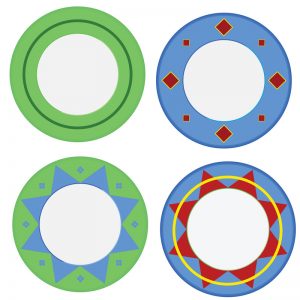How many different eating patterns – or types of diet – can you name?
I just returned from the annual meeting of the American Association of Cardiovascular and  Pulmonary Rehabilitation (AACVPR), where I was invited to speak about the research on dietary patterns and the practical take-home messages that stem from that research. AACVPR is a multidisciplinary group of health professionals who help people recover following a heart attack, heart surgery or chronic respiratory disease.
Pulmonary Rehabilitation (AACVPR), where I was invited to speak about the research on dietary patterns and the practical take-home messages that stem from that research. AACVPR is a multidisciplinary group of health professionals who help people recover following a heart attack, heart surgery or chronic respiratory disease.
Just as in studies of diet and cancer risk, research related to heart disease increasingly emphasizes that it’s not individual nutrients or even specific foods, but overall eating patterns that make a key difference. Conference attendees included physicians, nurses, exercise physiologists, psychologists and dietitians. All hear patient questions about the Mediterranean diet, vegan diet, DASH diet and more, including confusion over headlines that identify each of these as “best”.
So what’s the best diet? I was speaking to a room so over-filled with health professionals wanting to hear about this that conference organizers set up a “satellite room” for the overflow.
My presentation focused on getting beyond name recognition of these eating patterns to understanding what each involves, and what the research about each does and does not show. People found it helpful to learn that the Mediterranean diet linked to health is not the diet they see when traveling in Italy or Greece today – it’s the fast-disappearing eating pattern identified in Mediterranean areas in the 1960s.
We talked about how some low-fat diets mean no added fat or oil at all, while some aim for more moderate targets, and others focus on the type of fat. And we talked about how, depending on genetics, medical condition and personal/family lifestyle, the eating pattern that is best for one person is not necessarily best for all. We also talked about an important issue being, “Best compared to what?”
When you look at eating patterns associated with better health, on the surface they look and taste different. But they come down to variations on a predominantly plant-focused eating pattern. Whether your most immediate concern is heart disease or cancer risk, research is showing more and more overlap in the metabolic environment inside our bodies that promotes development of both diseases. If we are seeking health and vitality – not just trying to escape one disease or the other – then we need to focus on how eating and lifestyle choices come together to work in this direction.
I’ll be talking about eating patterns and cancer risk in a webinar for health professionals on October 29. I’m thrilled to be joined in that program by my colleague, author Sharon Palmer, RDN. Sharon will focus on how to make the foods in each dietary pattern healthy and delicious.
You can read more about the webinar and sign up here.
Karen Collins, MS, RDN, CDN, is AICR’s Nutrition Advisor. Karen is a speaker, writer and consultant who specializes in helping people make sense of nutrition news. You can follow her blog, Smart Bytes®, through her website and follower her on Twitter as @KarenCollinsRD.






Thanks for recomendation